-
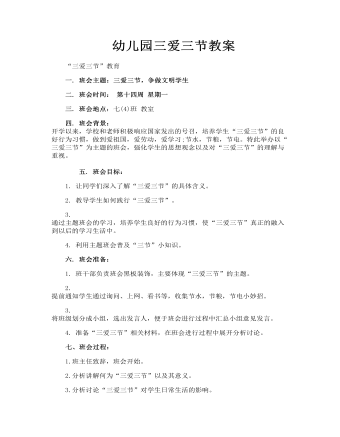
幼儿园教案三篇 幼儿园三爱三节教案
五. 班会目标: 1. 让同学们深入了解“三爱三节”的具体含义。 2. 教导学生如何践行“三爱三节”。 3. 通过主题班会的学习,培养学生良好的行为习惯,使“三爱三节”真正的融入到以后的学习生活中。 4. 利用主题班会普及“三节”小知识。 六. 班会准备: 1. 班干部负责班会黑板装饰,主要体现“三爱三节”的主题。 2. 提前通知学生通过询问、上网、看书等,收集节水,节粮,节电小妙招。 3. 将班级划分成小组,选出发言人,便于班会进行过程中汇总小组意见发言。
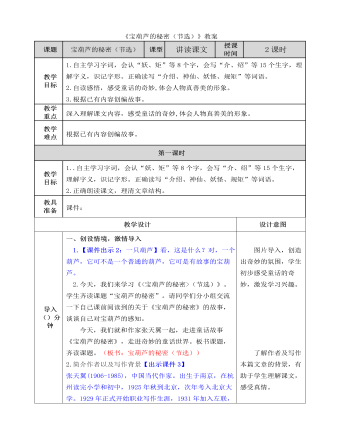
部编人教版四年级下册《 宝葫芦的秘密(节选)》教案
一、创设情境,激情导入1.【课件出示2:一只葫芦】看,这是什么?对,一个葫芦,它可不是一个普通的葫芦,它可是有故事的宝葫芦。2.今天,我们来学习《(节选)》。学生齐读课题“宝葫芦的秘密”。请同学们分小组交流一下自己课前阅读到的关于《宝葫芦的秘密》的故事,谈谈自己对宝葫芦的感知。今天,我们就和作家张天翼一起,走进童话故事《宝葫芦的秘密》,走进奇妙的童话世界。板书课题,齐读课题。(板书:宝葫芦的秘密(节选))2.简介作者以及写作背景【出示课件3】
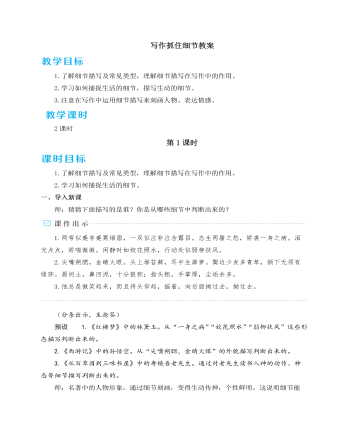
人教部编版七年级下册写作抓住细节教案
(生动手写下来,小组交流,推荐三至五个同学全班交流)师小结:正如巴尔扎克说的“唯有细节将组成作品的价值”。同学们在写作中可恰当地添加肖像、语言、动作、景物等细节描写,用上合适的修辞手法,细化分解过程,尽最大的努力,让描写细致生动起来,让内容充实起来。【设计意图】本环节引导学生通过具体句子的分析对比,学习归纳表达细节的方法,并运用这些方法练习。这些方法可操作性强,易于学生学习和评价。三、实践运用,描摹细节1.修改习作,打磨细节。(1)在本节课开头展示的修改习作中选出两篇。(生推荐,屏幕展示)(2)师生就所选习作中的某个段落,围绕一个中心词,如喜欢、赞赏、讨厌、厌恶等,全班集体修改,学习如何运用肖像、语言和动作等细节描写表情达意。(3)展示修改片段,对比原文。(4)生点评修改效果谈收获。
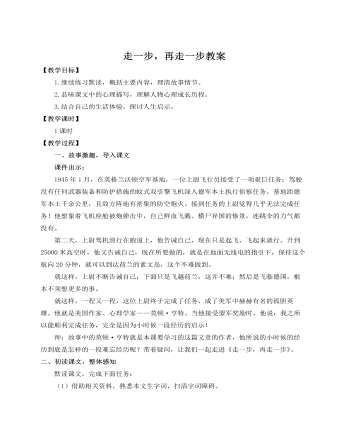
人教部编版七年级语文上册走一步,再走一步教案
预设 大困难是由小困难组成的,小困难是不难战胜的,一步一步战胜了小困难,最后就能战胜大的困难。当然,重要的还在于走好每一步,一步一步坚持不懈地走下去。在人生道路上,面对困难,“走一步,再走一步”这种人生经验,给人以战胜一切艰难险阻的信心。结束语:古语说得好,“宝剑锋从磨砺出,梅花香自苦寒来”。人的一生少不了经受挫折与磨难,但也正是在战胜困难的经历中,我们的人生才变得充实而有意义。当我们面对困难时,鼓起勇气,大声地对自己说:“走一步,再走一步。”【设计意图】本环节巧妙运用课文批注,引发学生思考,并引导学生结合自己的生活体验,从几个角度,开放性探讨获得的人生启示,让学生在轻松的氛围中,获得启示,启迪他们在生活中去运用这些人生经验,战胜困难。
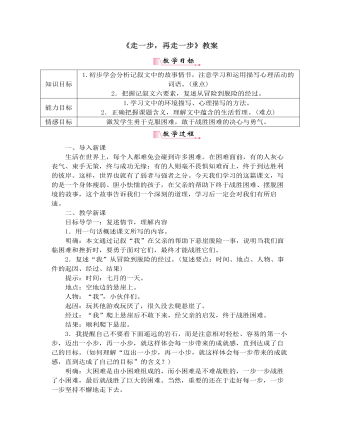
部编版语文七年级上册《走一步再走一步》教案
【教学提示】题目的设计意图是要培养同学们患难与共的爱心,克服困难的勇气和决心。目标导学二:分析环境和心理描写1.文章开头为什么突出“酷热”?明确:开头一自然段主要写孩子们为什么想到去爬悬崖。写天气的酷热,通过环境描写,突出了人物的心理,即酷热使人烦躁,小伙伴就厌倦了正在玩的游戏,从而想到很久没有爬悬崖。2.“时间在慢慢地过去。影子在慢慢拉长,太阳已经没在西边低矮的树梢下,夜幕开始降临。”“暮色中,第一颗星星出现在天空中,悬崖下面的地面开始变得模糊。”这两句话是什么描写?请简要分析其作用。明确:这是典型的环境描写,很好地烘托了“我”的恐惧心理。3.当“我”被弃于悬崖时,“我”的心理状态是怎样的?请从文中找出描写“我”处于险境中的心理状态的词句。明确:“我”的心理状态是恐惧。词语:阵阵晕眩、天旋地转、神情恍惚。句子:“我听见有人在哭泣、呻吟;我想知道那是谁,最后才意识到那就是我。”“我趴在岩石上,神情恍惚,害怕和疲劳已经让我麻木。”
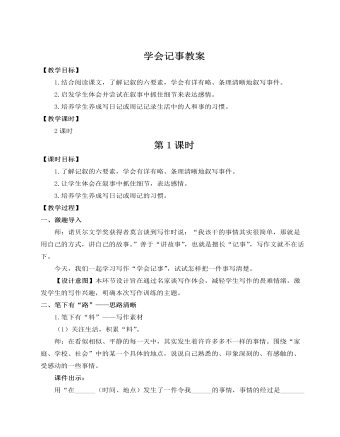
人教部编版七年级语文上册学会记事教案
家是圆心,我们都是圆内的点,爸爸、妈妈和我,我们围着圆心在走,走出一个圆满的家。(开篇点题。)清风摇曳梧桐树的小时候——(独立成段,设置场景,富有意境。)月亮又悄悄爬上了窗外的梧桐树,我靠在床头,该是听妈妈讲故事的时候了,可是妈妈又晚督班去了。妈妈是一名老师,每天兢兢业业,总有忙不完的事情。每次回家,总是带着匆匆的脚步,充斥着紧张的氛围,有时怀里还抱着几本厚厚的书。“妈妈,你不爱我了吗?为什么不在我身边?”我握住妈妈的手,她的手上还有白色的粉笔灰。“孩子……”妈妈哽住了,转过头去,眼里含着透明的水珠。她摸了摸我的头,指了指窗外的月亮:“月儿圆的时候,妈妈就会回来。”我蹦蹦跳跳跑到窗前,每个夜晚不停地寻找那圆圆的月亮——那是妈妈回来的希望。在梧桐摇曳,月儿圆圆缺缺的岁月里,充满了等待的苦涩、团聚的欢乐。
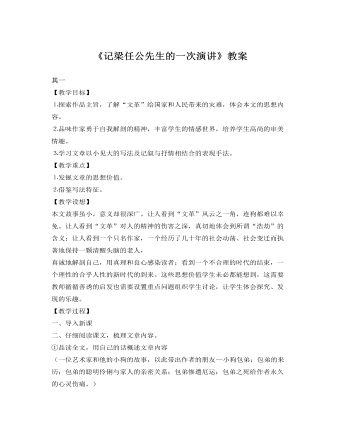
人教版高中语文《记梁任公先生的一次演讲》教案
十、教学后记:这是我实习中上的第一堂课,由于没有经验,对时间的把握不好,课堂前半部分留给学生思考回答问题的时间太多了,以至于没有完成本课时的教学内容,对《箜篌引》、《桃花扇》、《闻官军收河南河北》内容的补充要留到下节课才能完成。但课堂过程中以讨论和结果发布会的形式非常能调动学生的学习积极性,这节课学生的参与度很高,绝大部分的同学都能积极思考,并敢于回答问题。但是在学生回答问题后,有些答案很好,也是我没有思考到的。但是除了简单的表扬鼓励外,我不善于把学生的思考结果与自己的板书设计结合起来,授课过程中比较拘泥于教案,显得不够灵活。总的来说,这节课的优点是教态自然、大方,声音清晰洪亮,能调动学生学习的积极性,不足在于时间掌握不好,拘泥于教案。
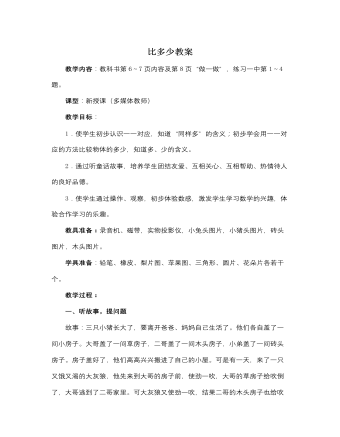
人教版新课标小学数学一年级上册比多少教案
4.操作。(“做一做”第2题) 全班同学动手操作,1名同学到投影仪上操作。 (1)第1行摆5个△,在△下面摆○,△要比○多1个。第2行摆几个○? (2)第1行摆4朵红花,摆的黄花比红花少1朵,第2行摆几朵黄花? 二、运用新知 教科书练习一第1~4题。 1.第1题:左图是猴子多,右图是骨头多。(避免学生产生思维定势) 2.第2题:学生观察,看到公鸡和鸭子虽然摆的一样长,但疏密不同,进而判断摆的密的鸭子的只数多些,而公鸡只数少些。 3.第3题:学生在观察到第一排蛋糕同样多的基础上,只需比较两盒中的第二排。第二排多的就多些,反之,就少些。 4.第4题:此题是在同一排中比较多少,当第5次循环出现珠子时,只出现了一个黄色珠子,所以黄珠子多而红珠子少。 三、总结 教师:今天我们学习了“比一比”,知道在比较时,一定要一个对着一个比,就会得到正确的结果。
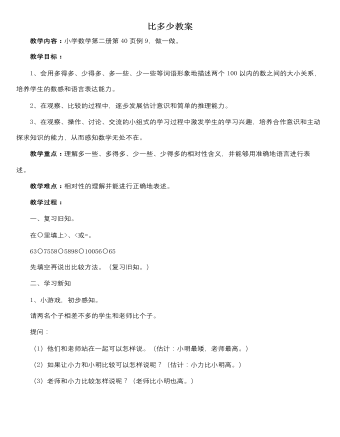
人教版新课标小学数学一年级下册比多少教案
教学目标:1、会用多得多、少得多、多一些、少一些等词语形象地描述两个100以内的数之间的大小关系,培养学生的数感和语言表达能力。2、在观察、比较的过程中,逐步发展估计意识和简单的推理能力。3、在观察、操作、讨论、交流的小组式的学习过程中激发学生的学习兴趣,培养合作意识和主动探求知识的能力,从而感知数学无处不在。教学重点:理解多一些、多得多、少一些、少得多的相对性含义,并能够用准确地语言进行表述。教学难点:相对性的理解并能进行正确地表述。教学过程:一、复习旧知。在O里填上>、<或=。63O7558O5898O10056O65先填空再说出比较方法。(复习旧知。)
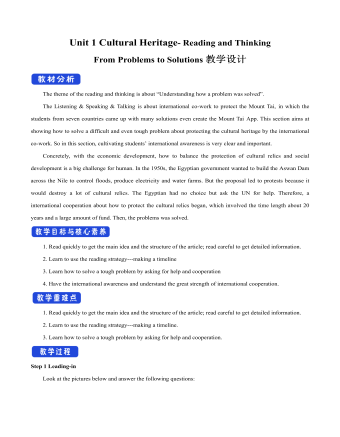
新人教版高中英语必修2Unit 1 Cultural Heritage-Reading and Thinking教案一
The theme of the reading and thinking is about “Understanding how a problem was solved”.The Listening & Speaking & Talking is about international co-work to protect the Mount Tai, in which the students from seven countries came up with many solutions even create the Mount Tai App. This section aims at showing how to solve a difficult and even tough problem about protecting the cultural heritage by the international co-work. So in this section, cultivating students’ international awareness is very clear and important. Concretely, with the economic development, how to balance the protection of cultural relics and social development is a big challenge for human. In the 1950s, the Egyptian government wanted to build the Aswan Dam across the Nile to control floods, produce electricity and water farms. But the proposal led to protests because it would destroy a lot of cultural relics. The Egyptian had no choice but ask the UN for help. Therefore, a international cooperation about how to protect the cultural relics began, which involved the time length about 20 years and a large amount of fund. Then, the problems was solved. 1. Read quickly to get the main idea and the structure of the article; read careful to get detailed information.2. Learn to use the reading strategy---making a timeline3. Learn how to solve a tough problem by asking for help and cooperation4. Have the international awareness and understand the great strength of international cooperation.1. Read quickly to get the main idea and the structure of the article; read careful to get detailed information.2. Learn to use the reading strategy---making a timeline.3. Learn how to solve a tough problem by asking for help and cooperation.

新人教版高中英语必修2Unit 2 Wildlife Protection-Reading and Thinking教案一
The listening and speaking part aims at how to protect and help endangered animals by listening, speaking and talking about the facts and reasons. This lesson analyzes the decreasing clause of Tibetan antelope population and the measures of protecting Tibetan antelopes. So students can be guided to learn to analyse the title and use different reading skills or strategies, like scanning, skimming and careful reading.1. Read quickly to get the main ideas and the purpose of going to Tibetan; read carefully to understand what the author see and think.2. Understand the sentences of the present continuous passive voice such as “Much is being done to protect wildlife.” and the inverted sentence “Only when we learn to exist in harmony with nature can we stop being a threat to wildlife and to our planet.”3. Enhance the awareness of protecting wildlife.4. Cultivate the reading methods according to different materials.1. Read quickly to get the main ideas and the purpose of going to Tibetan; read carefully to understand what the author see and think.2. Understand the sentences of the present continuous passive voice such as “Much is being done to protect wildlife.” and the inverted sentence “Only when we learn to exist in harmony with nature can we stop being a threat to wildlife and to our planet.”3. Cultivate the reading methods according to different materials.Step 1 Leading-inWatch a video about elephants and whales and then ask:Why are they endangered ? They are killed/hunted

新人教版高中英语必修2Unit 2 Wildlife Protection-Reading For Writing教案一
1. 标题首先根据海报的特点、格式写明标题。海报中往往把内容作为大标题。例如: Save the earth, Save the birds。2. 正文部分不同的海报其正文部分的侧重点不同。对于介绍性的海报, 首先要引出话题, 其次列出原因, 最后是总结。对于宣传类的海报, 要写明具体内容, 如: 活动内容, 地点以及参加活动的注意事项, 主持或举办单位等。1. 图片: 要选择引人注目的图片, 与主题要相关, 色彩明亮。话题句式 1. It is a treasure of our country. 它是我国的国宝。2. Believe it or not, at present only several thousand pandas exist in the world. 信不信由你, 目前世界上仅现存几千只熊猫。 3.It’s because of human activities that tigers are endangered. 正是因为人类的活动, 老虎处于濒危的状态。4. Many wild animals are in danger of dying out. 很多野生动物面临着灭绝的危险。 5. The government has taken effective measures to protect them. 政府已采取有效的措施来保护它们。6. People should raise the awareness of the protection of wild animals. 人们应该提高保护野生动物的意识。 7. It’s amazing that there are merely less than 1, 000 finless porpoises living in China. 非常令人吃惊, 目前中国仅有不足1 000只江豚。

新人教版高中英语必修2Unit 3 The Internet-Discovering Useful Structure教案一
This unit is about the Internet, which has a great influence to our humans and our lives. During the Listening & Speaking & Talking and Reading and Thinking section, the influence in examples has been shown. Thus, use the Present Perfect Tense is appropriate. However, in order to show the justice or weaken the doer of the behavior/action, it’s better to use the Present Perfect Passive Voice than the Present Perfect Tense. Besides, having learned to use the Present Perfect Passive Voice, students can beautify their language in their writing. 1. Learn the structure of the Present Perfect Passive Voice and its functions. 2. Learn to change the sentences with the Present Perfect Passive Voice into the sentences with the Present Perfect Passive Voice. 3. Learn to write sentences with the Present Perfect Passive Voice flexibly according to the context. 1. Learn the structure of the Present Perfect Passive Voice and its functions. 2. Learn to change the sentences with the Present Perfect Passive Voice into the sentences with the Present Perfect Passive Voice. 3. Learn to write sentences with the Present Perfect Passive Voice flexibly according to the context. Step 1 Observe the following sentences, then change the sentences into passive voice.He has been selected to take part in the sports meeting.(肯定句)他已被挑选出来参加运动会。The ink has not been removed from his overcoat.(否定句)墨迹还没有从他外套上去掉。

新人教版高中英语必修2Unit 3 The Internet-Listening &Speaking&Talking教案一
Listening and Speaking introduces the topic of “ask about online habits”. Many middle school students have been surfing the Internet for many years, but what they do with the Internet and how much time they spend every day may not be very clear to themselves, nor to other students. This section allows students to investigate their peers' Internet use, which is conducive to their mutual understanding and understanding of the Internet. It can also help them reflect on their own online behavior, learn from other people's good online habits, and get rid of their bad online behavior.The listening text of this section is an investigation interview. The investigators interview specific groups with the same questions to obtain information, so as to understand their views, practices or attitudes on this issue. There are two specific questions: “how much time do you spend online every day? What do you usually do online?”. The answers of the three respondents provide rich and different information, and achieve the purpose of the investigators. The oral discourse structure of survey interviews generally includes greeting and explaining the purpose of the interview, presenting the interview questions and the respondents' answers. Listening and Talking introduces the theme of “choosing the right application ". Listening text is a conversation between Laura and Xiao Bo. In this part of listening, “oink”; “piggy bank” may cause the students' hearing comprehension limitation. Oink refers to sound word and pig's sound. So, add some oink to my piggy bank is often used to describe "making a little money".1. Guide students to understand the content of listening texts in terms of listening for definitions.2. Cultivate students' ability to define words and understand an investigation interview.

新人教版高中英语必修2Unit 4 History and Traditions-Discovering Useful Structure教案一
Step 5 Practice一、完成下列句子。1. Judy and I _______________(把车停下来(park))in an underground car Park near Trafalgar Square, where we could ______________________(让我们的车充电(charge)).2. When we finally reached the service desk to ask for audio guides, we heard it ___________ that there were no audio guides____________(留下,剩下).3. We__________________________(发现自己对...很惊讶)the large number of visitors and the amount of noise at the entrance of the National Gallery.4. Judy ____________________(眼神专注于) Van Gogh’s Sunflowers. It was hard to approach the painting as there were so many people around.5. She ____________________(把这幅画的复制品装箱(box)) to ensure that it was delivered safely.答案:1.had our car parked get our car battery charged 2. announced left 3. found ourselves very surprised 4. had her eyes fixed on 5. had a copy of the painting boxed二、用过去分词对下列句子进行改写。1. Loch Ness was surrounded by beautiful natural landscape, which made it look amazing.2. Carl and his friend stayed with a generous family who offered them bread with butter and honey that was homemade.3. The family’s ancestors once attended to soldiers who were wounded in the First World War.4. The young people were attracted by the legend of Loch Ness. They watched over the lake with their cameras and binoculars, which were positioned on the hill.答案:1. Loch Ness surrounded by beautiful natural landscape looks amazing.2. Carl and his friends stayed with a generous family who offered them homemade bread with butter and honey.3. The family’s ancestors once attended to wounded soldiers in the First World War.4. The young people attracted by the legend of Loch Ness watched over the lake with their cameras and binoculars positioned on the hill.

新人教版高中英语必修2Unit 3 The Internet-Reading and Thinking教案一
Paragraph 3. Jan decided to start an IT club to teach old people how to use computers and the Internet. Paragraph 4. Jan has started taking online classes to learn more about how to use the Internet to make society better. Paragraph 5. Jan’s life has been greatly improved by the Internet. Step 5: Critical thinking:(1)How do you arrange your time spent on study and the Internet? Is it reasonable? I usually surf the Internet using my mobile phone for only an hour after class, and it is reasonable for me.(2)What are your online activities? Are they safe? I chat with my friends, read news and play games. I never give away my private information so I think they are safe.Step 4: summary Much has been written about the wonders of the World Wide Web. There are countless articles (1)______(tell) us how the Internet has made our lives more convenient. But the Internet has done a lot (2)_____(much) for people than simply make life more convenient. People’s lives (3) _________________(change) by online communities and social networks so far. Take Jan for example, who developed a serious illness that made her (4)_____(stick) at home with only her computer to keep (5)___(she) company. She joined an online group (6)______ she could share problems, support and advice with others. She considered the ability to remove the distance between people as one of the greatest (7)_______(benefit). She was so inspired (8)____ she started an IT club in which many people have been helped. She has started to learn more about how to use the Internet to make society better. Her next goal is to start a charity website to raise money (9)___ children in poor countries. Jan’s life has been (10)______(great) improved by the Internet. Step 5 Homework:Review what we have learned and find out the key language points in the text.

新人教版高中英语必修2Unit 4 History and Traditions-Listening&Speaking&Talking教案一
This unit is about history and traditions. From the opening page, we can know that this unit will introduce the history and traditions around the world. As Marcus Garvey says “A people without the knowledge of their past history, origin and culture is like a tree without roots”, it is important for students to realize the importance and value of knowing the history and traditions and their further meanings. And this part ( listening and speaking ) is divided into two parts: Part A---share views on historic sites, Part B ---talk about a visit to a historic tourist destination. By talking with a foreigner, the speakers introduce the historic attractions and their cultures. Part A is that William, a British student, who was going to visit the Confucius Temple and a Chinese student, Xiao Kong, who was going to the Confucius Temple to meet with the members of the research group, went together and exchanged their views on the Confucius Temple, Confucius, Confucius' descendants and Confucius' educational thoughts. Part B is a conversation between Xiao Yan, a youth hostel receptionist and Paul, a backpacker about the feelings and experience after visiting the Chinese famous tourist attraction Pingyao.1. Guide students to understand the content of listening texts in terms of the whole and key details; 2. Cultivate students' ability to guess the meaning of words in listening; discuss with their peers how to talk about historic spots and great person.3. Instruct students to use functional sentences of showing one’s excitement, surprise and disappointment.1. Guide students to understand the content of listening texts in terms of the whole and key details; 2. Cultivate students' ability to discuss with their peers the related topics.3. Enable students to use the functional items of showing one’s excitement, surprise and disappointment.

新人教版高中英语必修2Unit 3 The Internet-Reading For Writing教案一
⑦identity theft 身份盗窃⑧chat room 聊天室⑨draft your blog post 起草博客帖子⑩post embarrassing photos 张贴尴尬照片 【话题句式】 1. How do you stay safe online and avoid bad experiences on the Internet? 你如何在网上保持安全, 避免在网上的不良经历? 2. I’m not an expert, but many years as a blogger have taught me a thing or two. 我不是专家, 但作为一个博主, 我已经学了好几年了。 3. If you see or read something that makes you feel uncomfortable, leave the site immediately. 如果你看到或读到一些让你觉得不舒服的东西, 立即离开这个网站。4. Don’t give out your address or phone number. 别告诉别人你的地址或电话号码。 5. Identity theft is a common and serious problem. 身份盗窃是一个常见而严重的问题。6. Being online is no excuse for being rude, and you don’t want to become a target for a troll or cyberbully. 上网并不是无礼的借口, 你也不想成为发挑衅帖子的人或网络恶霸的目标。 7. Trolls often use several false names so that they can stay on a site. 发挑衅帖子的人经常使用几个假名, 这样他们就可以留在一个网站上。8. However, the more polite you are, the less likely it is you will be attacked. 然而, 你越有礼貌, 你被攻击的可能性就越小。

新人教版高中英语必修2Unit 4 History and Traditions-Reading and Thinking教案一
Features of languages1.Finally, in the 20th century, the southern part of Ireland broke away from the UK, which resulted in the full name we have today: the United Kingdom of Great Britain and Northern Ireland.该句是一个复合句。该句主句为:the southern part of Ireland broke away from the UK;which resulted in the full name we have today为which引导的定语从句代指前面整句话的内容,we have today为定语从句修饰先行词name。译文:最后,在20世纪,爱尔兰南部脱离英国,这导致了我们今天有的英国的全名:大不列颠及北爱尔兰联合王国。2.Almost everywhere you go in the UK, you will be surrounded by evidence of four different groups of people who took over at different times throughout history.该句是一个复合句。该句主句为:you will be surrounded by evidence of four different groups of people;其中Almost everywhere you go in the UK为让步状语从句; who took over at different times throughout history为定语从句修饰先行词people。译文:几乎无论你走到英国的任何地方,你都会发现历史上有四种不同的人在不同的时期统治过英国。3.The capital city London is a great place to start, as it is an ancient port city that has a history dating all the way back to Roman times.该句是一个复合句。该句主句为:The capital city London is a great place to start; as it is an ancient port city that has a history dating all the way back to Roman times.为原因状语从句;dating all the way back to Roman times为现在分词短语作定语修饰history。

新人教版高中英语必修2Unit 5 Music-Discovering Useful Structures教案一
Step1:自主探究。1.(教材P52)Born(bear) in the USA on 2 January 1970, Whitacre began studying music at the University of Nevada in 1988.2.(教材P52) Moved(move) by this music, he said, “It was like seeing color for the first time.”3.(教材P56)I was very afraid and I felt so alone and discouraged(discourage).4.(教材P58)Encouraged(encourage) by this first performance and the positive reaction of the audience, I have continued to play the piano and enjoy it more every day.Step2:语法要点精析。用法1:过去分词作表语1).过去分词可放在连系动词be, get, feel, remain, seem, look, become等之后作表语,表示主语所处的状态Tom was astonished to see a snake moving across the floor.汤姆很惊讶地看到一条蛇正爬过地板。Finally the baby felt tired of playing with those toys.终于婴儿厌倦了玩那些玩具。注意:1).过去分词作表语时与被动语态的区别过去分词作表语时,强调主语所处的状态;而动词的被动语态表示主语是动作的承受者,强调动作。The library is now closed.(状态)图书馆现在关闭了。The cup was broken by my little sister yesterday.(动作)昨天我妹妹把杯子打碎了。2)感觉类及物动词的现在分词与过去分词作表语的区别过去分词作表语多表示人自身的感受或事物自身的状态,常译作“感到……的”;现在分词多表示事物具有的特性,常译作“令人……的”。


